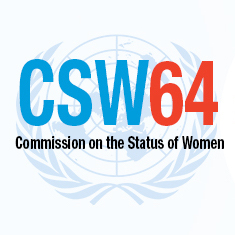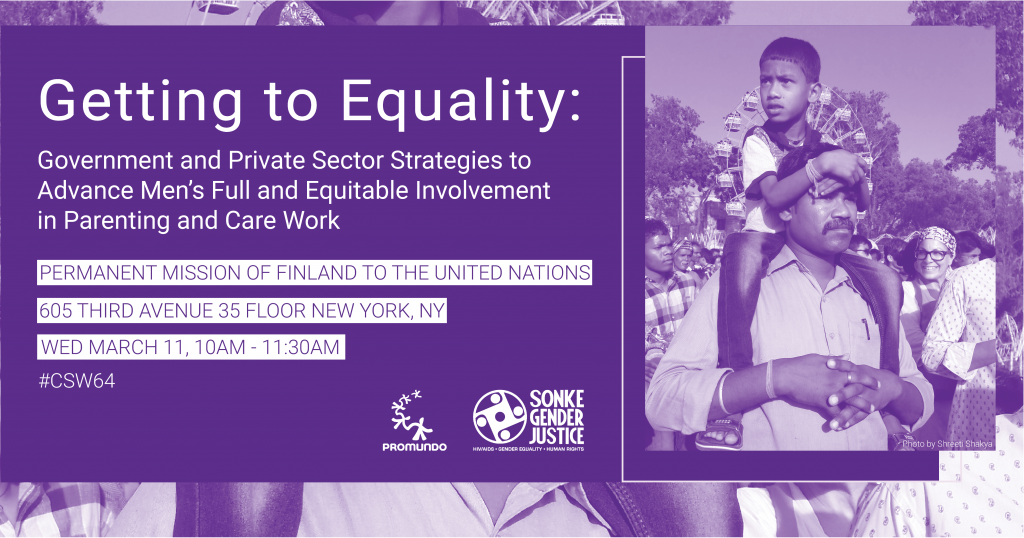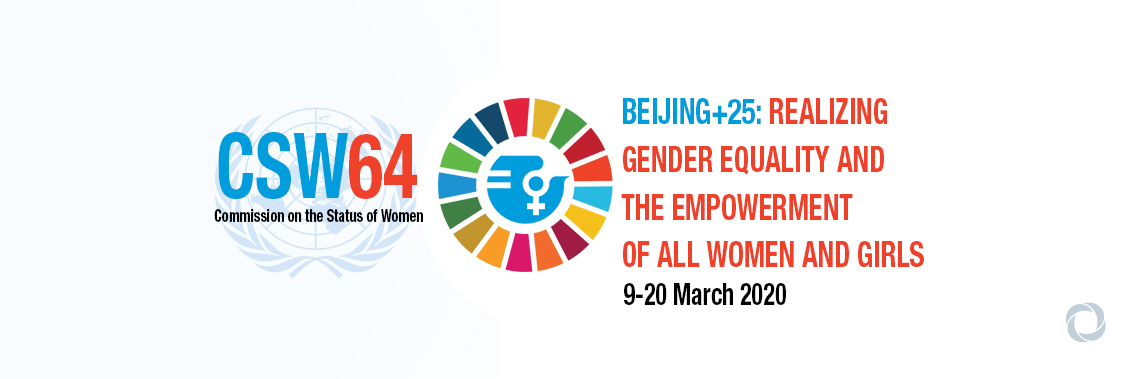
Following the UN Secretary-General’s recommendation to Member States to amend the format of the 64th session of the UN Commission on the Status of Women in light of the current concerns regarding coronavirus disease (COVID-19), the Commission decided that the 64th session of the Commission will convene on 9 March, at 10.00 a.m. (EST), for a procedural meeting. The meeting will include opening statements, followed by the adoption of the draft Political Declaration and action on any other draft resolutions. The session will then suspend until further notification. More information here.
The sixty-fourth session of the Commission on the Status of Women, or CSW64, is planned to take place at the United Nations Headquarters in New York, US March 9-20, 2020. The Commission on the Status of Women (CSW) is the principal global intergovernmental body exclusively dedicated to the promotion of gender equality and the empowerment of women.
This year, framed within the context of the 2030 Agenda for Sustainable Development, the session will focus on assessing the current challenges that affect the implementation of the Beijing Declaration and Platform for Action, a blueprint for advancing women’s rights, as well as the achievement of gender equality and the empowerment of women.
Equimundo will be represented by Gary Barker, President & CEO, Margaret Greene, Senior Advisor for Gender and Health, Dean Peacock, Senior Advisor for Global Advocacy, and Aapta Garg, Program Officer.
Join us at the following sessions:
Child, Early and Forced Marriages and Unions: A 2020 Snapshot
Date: Saturday, March 7
Time: 9:30 AM – 1:30 PM, lunch to follow
Location: Armenian Center, Armenian Hall, 630 2nd Ave, New York, NY 10016
Staff Represented: Margaret Greene
Organized by Zonta International, GreeneWorks and Save the Children, three panels present a snapshot of what we know about child marriage in 2020, provide a deeper focus on the issue in fragile settings, and review the latest evidence on what is being done to address it.
Regional Gender Equality Strategies in the Global Context of SDGs and Beijing+25
Date: Monday, March 9
Time: 1:15 PM – 2:30 PM
Location: ECOSOC Chamber, United Nations Headquarters NY, 10017
Staff Represented: Gary Barker
Regional gender equality strategies complement and inspire national gender equality strategies, gender equality legislation, gender-sensitive policies, and gender-transformative institutions. Hosted by European Equality Commissioner Helena Dalli, the side event will highlight the potential and contributions of Regional Gender Equality Strategies for the implementation of the Beijing Declaration and Platform for Action and the 2030 Agenda for Sustainable Development. Key stakeholders from regional entities from different parts of the world, regional institutions, multi-stakeholder initiatives, and civil society organizations will highlight their own approach and specificities. View the concept note here, and RSVP here.
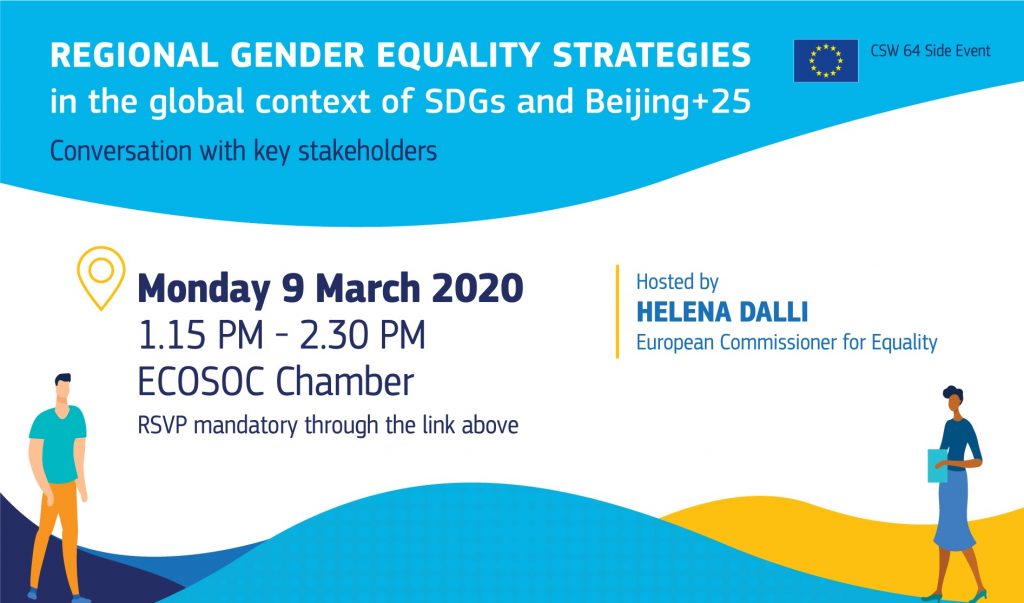
We’ve Got the Power: Gender Justice at the Forefront of the Next Decade of the Aids Responses
Date: Monday, March 9
Time: 1:15 PM – 2:30 PM
Location: Conference Room 6, United Nations Headquarters NY, 10017
Staff Represented: Dean Peacock
This side event will focus on harnessing the knowledge on what has been proven to work for women and girls and overcoming the blind spots in the current HIV response toward 20/20 vision in order to reach them with what they want and need — emphasizing marginalized communities of adolescent girls and young women at high risk of, affected, or living with HIV. This event is convened by UNAIDS, and led by Winnie Byanyima, Under-Secretary-General of the United Nations and Executive Director of UNAIDS in representation of the UNAIDS Joint Programme. For more information, contact here.
Feminist Approaches to Justice: Coordinating Community Responses
Date: Monday, March 9
Time: 2:30 PM – 4:00 PM
Location: Drew Room, Church Center for the United Nations, 77 United Nations Plaza, New York, NY 10017
Staff Represented: Dean Peacock
The Agreed Conclusions on The Elimination and Prevention of All Forms of Violence Against Women and Girls affirms the important role of the community in efforts toward eliminating all forms of violence against women and girls. This parallel event, convened by The Division on Women & Crime (DWC) of the American Society of Criminology, aims to highlight community mobilization activities around the world using the coordinated community response (CCR) approach, or community-wide efforts to bring together relevant stakeholders to address complex social problems.
Supporting and Protecting Sexual and Reproductive Health and Rights (SRHR) in Emergencies
Date: Tuesday, March 10
Time: 8:30 AM – 10:00 AM
Location: Japan Society, 333 E 47th St, New York, NY 10017
Staff Represented: Margaret Greene
This panel, coordinated by ODI’s Humanitarian Policy Group, will bring together key governments, donors, and development partners to reflect on the opportunities, challenges, and gaps in the field of SRHR in crisis settings and identify more effective and efficient ways to ensure that SRHR needs are prioritized and addressed across the emergency continuum.
Getting to Equal: Relationship Equality and Sexual and Reproductive Health and Rights (SRHR)
Date: Tuesday, March 10
Time: 11:00 AM – 1:00 PM
Location: Permanent Observer Mission of the African Union to the United Nations, 305 E 47th St 5th Floor, New York, NY 10017
Co-sponsored by Equimundo and Ipas, this session highlights the importance of continued efforts toward promoting women’s rights, gender equality and universal access to sexual and reproductive health and rights to advance in the implementation of the Beijing Declaration and Platform of Action. The session goal is to strengthen support for comprehensive programming that broadens the enabling environment for women and girls access to sexual and reproductive health, including contraception and safe abortion.
Getting to Equality: Government and Private Sector Strategies to Advance Men’s Full and Equitable Involvement in Parenting and Care Work
Date: Wednesday, March 11
Time: 10:00 AM – 11:30 AM
Location: Permanent Mission of Finland to the United Nations, 605 Third Avenue, 35 Floor, New York, NY 10158
Organized by Equimundo and Sonke Gender Justice, this panel will feature high-level speakers from UN agencies, private sector partners, national governments and civil society organizations who are doing pioneering work to promote men’s full and equitable involvement in care work—and by extension to achieve full gender equality. The panel aims to inspire UN agencies, national governments, employers, and civil society to commit to putting in place the changes in policies, attitudes, and behaviors that lead to care being valued and shared equally, and to motivate men to take on an equitable share of the world’s unpaid care work by 2030.
Gender-Transformative Approaches to Achieve Food Security, Improved Nutrition and Promote Sustainable Agriculture
Date: Wednesday, March 11
Time: 12:45 PM – 2:45 PM
Location: Delegation of the European Union to the United Nations, 666 Third Avenue, 31st Floor New York, NY 10017
Staff Represented: Gary Barker
This event aims to give worldwide visibility to the ongoing work under the Joint Programme on Taking Gender Transformative Approaches to Scale for impact on Food Security, Nutrition and Sustainable Agriculture implemented by the three Rome-based Agencies (FAO, IFAD and WFP) with financial support from the European Union (EU). Its purpose is also to raise awareness on the importance, relevance and benefits of gender-transformative approaches (GTAs) for the achievement of SDG2 and gender equality. It will also serve as a venue for other international development organizations to present their work and share their findings on GTAs in the context of food security and nutrition. View the programme here, and RSVP here.
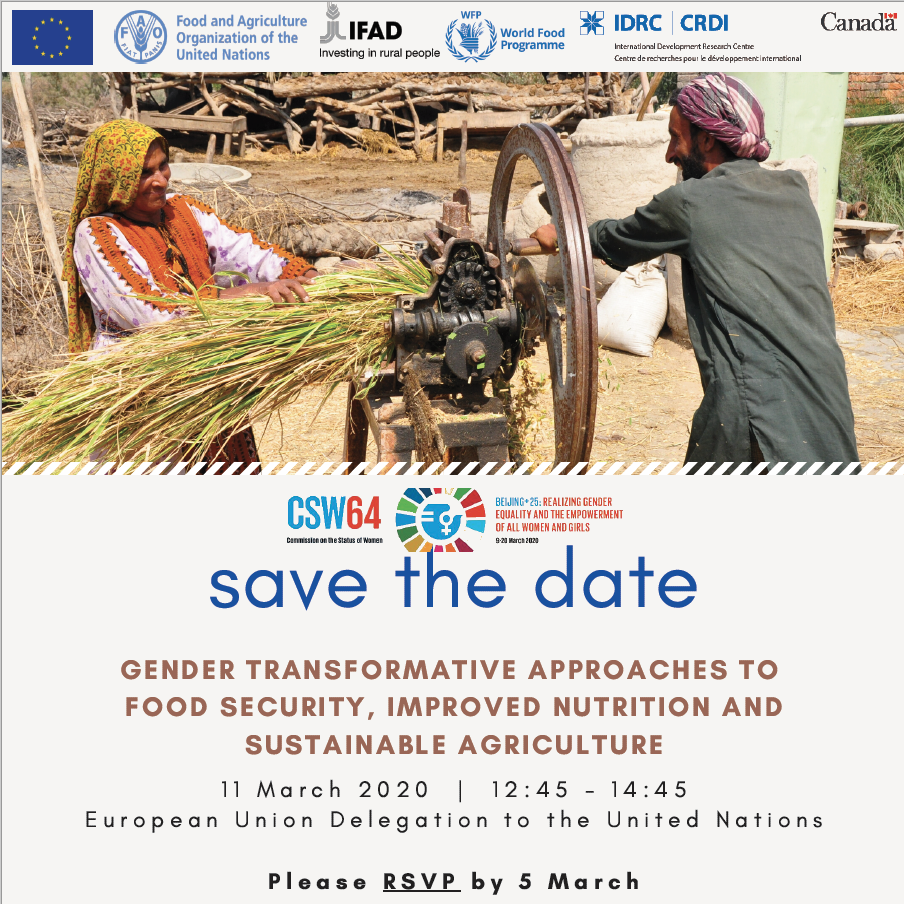
Preventing Intergenerational Cycles of Violence
Date: Thursday, March 12
Time: 10:00 AM – 11:30 AM
Location: Japan Society, 333 E 47th St, New York, NY 10017
Staff Represented: Dean Peacock
Two decades of studies affirm that exposure to violence in childhood increases the likelihood that an individual will experience or perpetrate intimate partner violence (IPV) in adulthood, as well as other forms of violence. Exposure to violence in childhood is by far the strongest predictor of whether a man uses violence later in life. Organized by Equimundo in partnership with Sonke Gender Justice, Together for Girls, End Violence Against Children, UNICEF, UN Women, WHO, SVRI, and Futures Without Violence, this panel will convene key stakeholders to explore how we can act on the evidence before us to put in place interventions that address trauma as a way to prevent future violence and improve the well-being of women and children. To RSVP, email here.
Lancet Series on Gender Equality, Norms and Health: A CSW Conversation Hosted by Population Council’s GIRL Center
Date: Tuesday, March 17
Time: 10:00 AM – 11:30 AM
Location: Population Council, One Dag Hammarskjold Plaza New York, NY 10017
Staff Represented: Margaret Greene
This conversation will focus on the recently published Lancet Series on gender equality, norms, and health. Experts will engage in a lively discussion about how to translate the findings of the Lancet Series into action. The panel discussion will be moderated by Thoai Ngo, director of the Population Council’s Poverty, Gender, and Youth (PGY) Program. This engaging session will be hosted by the Population Council’s new Girl Innovation, Research, and Learning (GIRL) Center, a global research center that generates, synthesizes, and translates evidence to transform the lives of adolescent girls.
Prevention+ Working with Men and Women to Prevent GBV
Date: Friday, March 20
Time: 12:30 PM – 2:00 PM
Location: Church Center for the United Nations, 10th Floor
Staff Represented: Aapta Garg
Coordinated by ABAAD, this discussion will serve as a space for audience to learn more of critical issues fundamental to engaging men and boys in preventing violence against women, while inspiring a wider conversation about fatherhood in increasingly complex social, economic, and political environments.
